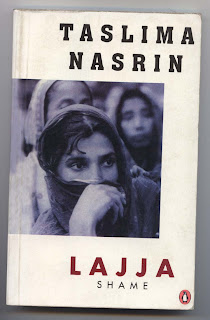Lajja - The Shame
 The Duttas - Sudhamoy, Kironmoyee, and their two children, Suranjan and Maya - have lived in Bangladesh all their lives. Despite being part of the country's small Hindu community, that is terrorized at every opportunity by Muslim fundamentalists, they refuse to leave their country, as most of their friends and relatives have done. And then, on 6 December 1992, the Babri Masjid at Ayodhya in India is demolished
The Duttas - Sudhamoy, Kironmoyee, and their two children, Suranjan and Maya - have lived in Bangladesh all their lives. Despite being part of the country's small Hindu community, that is terrorized at every opportunity by Muslim fundamentalists, they refuse to leave their country, as most of their friends and relatives have done. And then, on 6 December 1992, the Babri Masjid at Ayodhya in India is demolishedLajja (Bengali: লজ্জা Lôjja) is a novel in Bengali by Taslima Nasrin, a writer of Bangladesh. The word lajja/lôjja means "shame" in Bengali and many other Indian languages. The book was first published in 1993 in the Bengali language, and was subsequently banned in Bangladesh, and a few states of India. Taslima Nasrin, the writer of the book, has dedicated the book "to the people of the Indian subcontinent", and has announced the beginning of the book with these words: "let another name for religion be humanism." The novel is preceded by a preface and a chronology of events.
Lajja is a response of Taslima Nasrin to anti-Hindu riots which erupted in parts of Bangladesh, soon after the demolition of Babri Masjid in India on 6th December 1992. The book subtly indicates that communal feelings were on the rise, the Hindu minority of Bangladesh was not fairly treated, and secularism was under shadow.
In a far off place in Ayodhya, in the state of Uttar Pradesh in India, on 6th December 1992, Babri Masjid is demolished, and the demolition has repercussions even in Bangladesh, a different country, and a far off place from Ayodhya. The fire of communal rioting erupts, and the Dutta family also feels and faces the heat of the communal hatred. Each member of the Dutta family feels about this in his / her own way.
Sudhamoy, the patriarch of the family, feels that Bangladesh, his motherland, shall never let him down. Kironmoy as a faithful wife stands by her husband’s views. Suranjan, their son, believes that nationalism will be stronger than communism, but is progressively disappointed and finds himself adopting communal reactions which contrast entirely with the ideology of patriotism he has always had faith in. Nilanjana curses her brother’s apathy and coaxes his brother to take the family to a Muslim friend’s house for safety. It is a story of metamorphosis, that brought by unwelcome events which destroy everything one believed in. Violence and resentment are the sole winners.
In this book, she compares the situation in Bengal to the situation in India. She also equates the fanatic groups there to BJP and RSS in India. She does miss some facts. India even though has 80% Hindus is not a Hindu republic. Minorities here are given equal (rather more) rights than the majority Hindus. The population of Minorities is on the rise and Majority population is reducing day by day. There are no temples left in Bengal or Pakistan nor is Any Hindu population. But you find Mosques in every nook and corner of the country. Muslims in India have their own law and rules, which in many muslim countries is unheard of. That is the difference between the fanatics muslims and self respecting Hindus. This book SHOULD be banned in India for hurting Hindus.


Comments